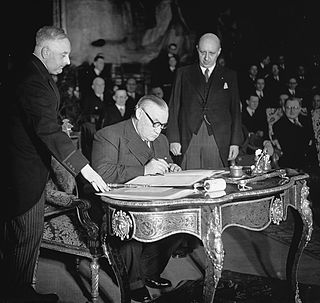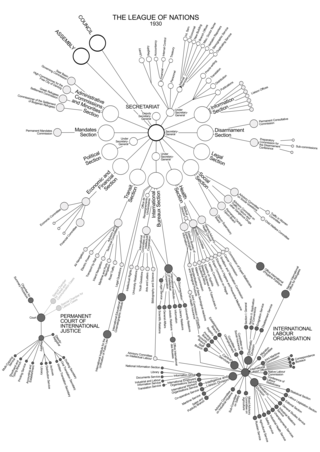Related Research Articles

The Benelux Union or Benelux is a politico-economic union and formal international intergovernmental cooperation of three neighbouring states in Western Europe: Belgium, the Netherlands, and Luxembourg. The name is a blend word formed from joining the first few letters of each country's name and was first used to name the customs agreement that initiated the union. It is now used more generally to refer to the geographic, economic, and cultural grouping of the three countries.

The Belgian Congo was a Belgian colony in Central Africa from 1908 until independence in 1960 and became the Republic of the Congo (Léopoldville). The former colony adopted its present name, the Democratic Republic of the Congo (DRC), in 1964.

The Vienna Convention on the Law of Treaties (VCLT) is an international agreement that regulates treaties among sovereign states.

The Hague Conventions of 1899 and 1907 are a series of international treaties and declarations negotiated at two international peace conferences at The Hague in the Netherlands. Along with the Geneva Conventions, the Hague Conventions were among the first formal statements of the laws of war and war crimes in the body of secular international law. A third conference was planned for 1914 and later rescheduled for 1915, but it did not take place because of the start of World War I.

The World Health Organization Framework Convention on Tobacco Control is a treaty adopted by the 56th World Health Assembly held in Geneva, Switzerland on 21 May 2003. It became the first World Health Organization treaty adopted under article 19 of the WHO constitution. The treaty came into force on 27 February 2005. It had been signed by 168 countries and is legally binding in 182 ratifying countries. There are currently 14 United Nations member states that are non-parties to the treaty.

The Treaty of Brussels, also referred to as the Brussels Pact, was the founding treaty of the Western Union (WU) between 1948 and 1954, when it was amended as the Modified Brussels Treaty (MTB) and served as the founding treaty of the Western European Union (WEU) until its termination in 2010. The treaty provided for the organisation of military, economic, social and cultural cooperation among member states as well as a mutual defence clause.

The Covenant of the League of Nations was the charter of the League of Nations. It was signed on 28 June 1919 as Part I of the Treaty of Versailles, and became effective together with the rest of the Treaty on 10 January 1920.

The year 1948 marked the beginning of the institutionalised modern European integration. With the start of the Cold War, the Treaty of Brussels was signed in 1948 establishing the Western Union (WU) as the first organisation. In the same year, the International Authority for the Ruhr and the Organization for European Economic Co-operation, the predecessor of the OECD, were also founded, followed in 1949 by the Council of Europe, and in 1951 by the European Coal and Steel Community, with the ensuing moves to create further communities leading to the Treaty of Rome (1957).
Sex work in Venezuela is legal and regulated. The country's Ministry of Health and Social Development requires sex workers to carry identification cards and to have monthly health checkups. Prostitution is common, particularly in Caracas and in other domestic tourist destinations. The Venezuelan sex work industry arose in conjunction with the oil industry of the twentieth century and continues today.

The Berne Convention for the Protection of Literary and Artistic Works, usually known as the Berne Convention, was an international assembly held in 1886 in the Swiss city of Berne by ten European countries with the goal of agreeing on a set of legal principles for the protection of original work. They drafted and adopted a multi-party contract containing agreements for a uniform, border-crossing system that became known under the same name. Its rules have been updated many times since then. The treaty provides authors, musicians, poets, painters, and other creators with the means to control how their works are used, by whom, and on what terms. In some jurisdictions these type of rights are referred to as copyright; on the European continent they are generally referred to as authors' rights or makerright.

A sexually transmitted infection (STI), also referred to as a sexually transmitted disease (STD) and the older term venereal disease (VD), is an infection that is spread by sexual activity, especially vaginal intercourse, anal sex, oral sex, or sometimes manual sex. STIs often do not initially cause symptoms, which results in a risk of transmitting them on to others. The term sexually transmitted infection is generally preferred over sexually transmitted disease or venereal disease, as it includes cases with no symptomatic disease. Symptoms and signs of STIs may include vaginal discharge, penile discharge, ulcers on or around the genitals, and pelvic pain. Some STIs can cause infertility.
The International Vaccine Institute (IVI) is a non-profit, autonomous international organization established with the mandate of making vaccines available for all. Collaborating closely with the global scientific community, public health entities, governments, and industry stakeholders, IVI engages in every facet of the vaccine spectrum. This includes conducting new vaccine designs in laboratories, advancing vaccine development and assessment in real-world settings, and facilitating the sustainable integration of vaccines in regions where they are most urgently required.

The League of Nations was established with three main constitutional organs: the Assembly; the Council; the Permanent Secretariat. The two essential wings of the League were the Permanent Court of International Justice and the International Labour Organization.

The Maritime Labour Convention (MLC) is an International Labour Organization (ILO) convention, number 186, established in 2006 as the fourth pillar of international maritime law and embodies "all up-to-date standards of existing international maritime labour Conventions and Recommendations, as well as the fundamental principles to be found in other international labour Conventions". The other pillars are the SOLAS, STCW and MARPOL. The treaties applies to all ships entering the harbours of parties to the treaty (port states), as well as to all ships flying the flag of state party (flag states, as of 2021: over 91 per cent).
The 1952 Arrest Convention is a 1952 multilateral treaty whereby states agree to rules on the arrest of ships.
Brussels Agreement may refer to:
The Brussels Collision Convention is a 1910 multilateral treaty that established the rules of legal liability that result from collisions between ships at sea.
References
- ↑ "International Agreement of Brussels, 1924, respecting facilities to be given to merchant seamen for the treatment of venereal diseases: note from the Director-General" (PDF). 1957. Archived (PDF) from the original on 20 January 2022.
- World Health Organization, The Agreement of Brussels, 1924, respecting Facilities to be given to Merchant Seamen for the Treatment of Venereal Diseases: Report of a Study Group (WHO Technical Report Series, No. 150., 1958).
- (in French) Ratifications, official depositary information.